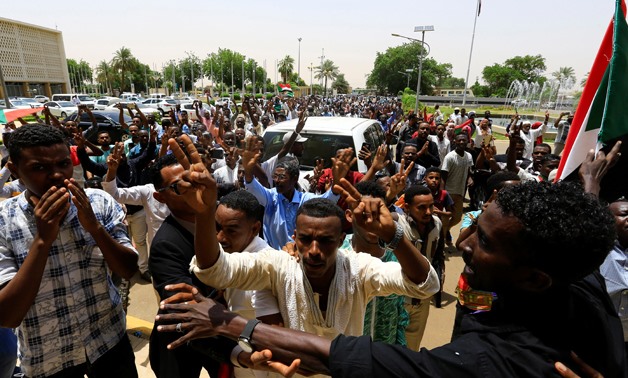
Sudanese people carry their national flag and chant slogans as they celebrate the signing of a constitutional declaration
CAIRO – 4 October 2024: Sudan's capital, Khartoum, witnessed fierce battles on Thursday as violent clashes erupted in the central area of Al-Muqrin. The Sudanese army launched a surprise military operation on September 26, aiming to reclaim control of the capital's three major cities, which have been dominated by the Rapid Support Forces (RSF) since the war began in April 2023.
General Abdel Fattah Al-Burhan, commander of the Sudanese Armed Forces, is actively moving between Khartoum and Omdurman to supervise military operations and monitor progress since the sudden attack began.
Meanwhile, the Sudanese government welcomed U.S. President Joe Biden's decision to lift American sanctions on Sudan under the Trafficking Victims Protection Act. This move allows Sudan to benefit from U.S. aid programs, especially crucial given the war's devastating impact on the nation's infrastructure.
Thursday saw renewed fighting between Sudan's armed forces and the RSF in central Khartoum, with violent clashes involving heavy artillery and airstrikes. Explosions were heard in the early hours, particularly in Al-Muqrin. Meanwhile, the army launched drone attacks on RSF positions in the southern neighborhoods of Al-Azhari and Al-Mujahideen.
Thick plumes of smoke rose over the neighborhoods of Jabra, around the Armored Corps, and east of the Nile.
The Sudanese army carried out several air raids on Wednesday night, targeting RSF positions in East Nile, Al-Manshiya, and the Bari area. In parallel, anti-aircraft units in the Nile River State reportedly downed three RSF drones east of Atbara, with no reported casualties.
General Abdel Fattah Al-Burhan has maintained his presence between Omdurman and the northern military area of Kadro, managing operations aimed at regaining control of the capital. He inspected the Third Infantry Division in Shendi, just hours after RSF drone attacks targeted the division’s headquarters, 150 kilometers north of Khartoum. The division successfully shot down all the attacking drones.
On September 26, the Sudanese army launched a major ground offensive against the RSF, supported by artillery and air cover. Forces crossed from Omdurman over the White Nile bridges into central Khartoum and positioned themselves in Al-Muqrin. The operation facilitated the army's advance from northern Omdurman across the Halfaya Bridge, where they joined forces with the Kadro military division, expanding control over the entire Halfiya district. RSF forces retreated southward toward Shambat.
Al-Burhan was seen inspecting military positions in northern Khartoum Bahri, making his first appearance in the area since the conflict began. He also visited the operational base at Hatab and met with residents in the region.
The Sudanese government expressed its appreciation for U.S. President Joe Biden's decision to lift certain restrictions on Sudan under the Trafficking Victims Protection Act. This decision opens the door for Sudan to receive American development assistance and benefit from the U.S. Agency for International Development’s (USAID) global health programs.
Sudan's Foreign Minister, Hussein Awad, hailed the move as a positive step in restoring bilateral relations and a critical factor in reconstruction efforts, particularly for the healthcare sector. He urged the U.S. government to take additional measures to ensure Sudan can access all available aid, considering the ongoing war and recent natural disasters.
This year, President Biden utilized his executive powers to exempt Sudan from sanctions imposed under the 2000 U.S. Trafficking Victims Protection Act. The exemption allows Sudan to continue receiving development aid and participate in global health initiatives.
In the face of war, Sudan is also battling a cholera outbreak. Health Minister Dr. Haitham Mohammed Ibrahim reported that cholera has spread to 10 states, with 555 deaths and nearly 18,900 cases. He cited major challenges in delivering medical supplies and services, particularly in RSF-controlled areas, where routes are blocked and resources are scarce.
The war has severely impacted Sudan’s healthcare system, with damages exceeding $11 billion. The conflict has destroyed medical equipment, pharmaceuticals, and healthcare facilities, rendering one-third of the country's 700 hospitals non-operational.
Minister Ibrahim stressed that the sector's needs are overwhelming, with a United Nations estimate placing the necessary humanitarian aid at $4.7 billion. However, only 25% of the required funds have been received, leaving healthcare workers unpaid and medical services drastically underfunded.
The war has resulted in significant losses for Sudan's healthcare sector, including the destruction of hospitals, looting of medical supplies, and loss of essential medical infrastructure.
Comments
Leave a Comment